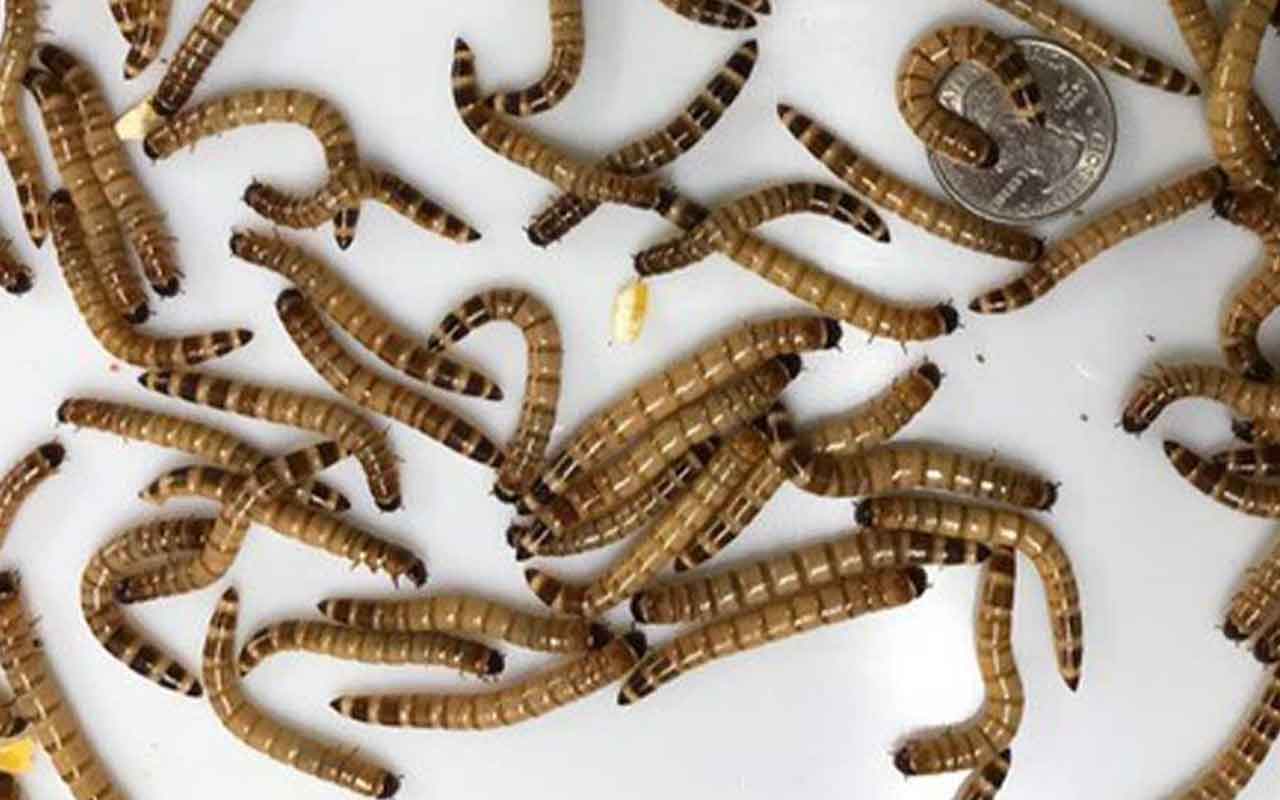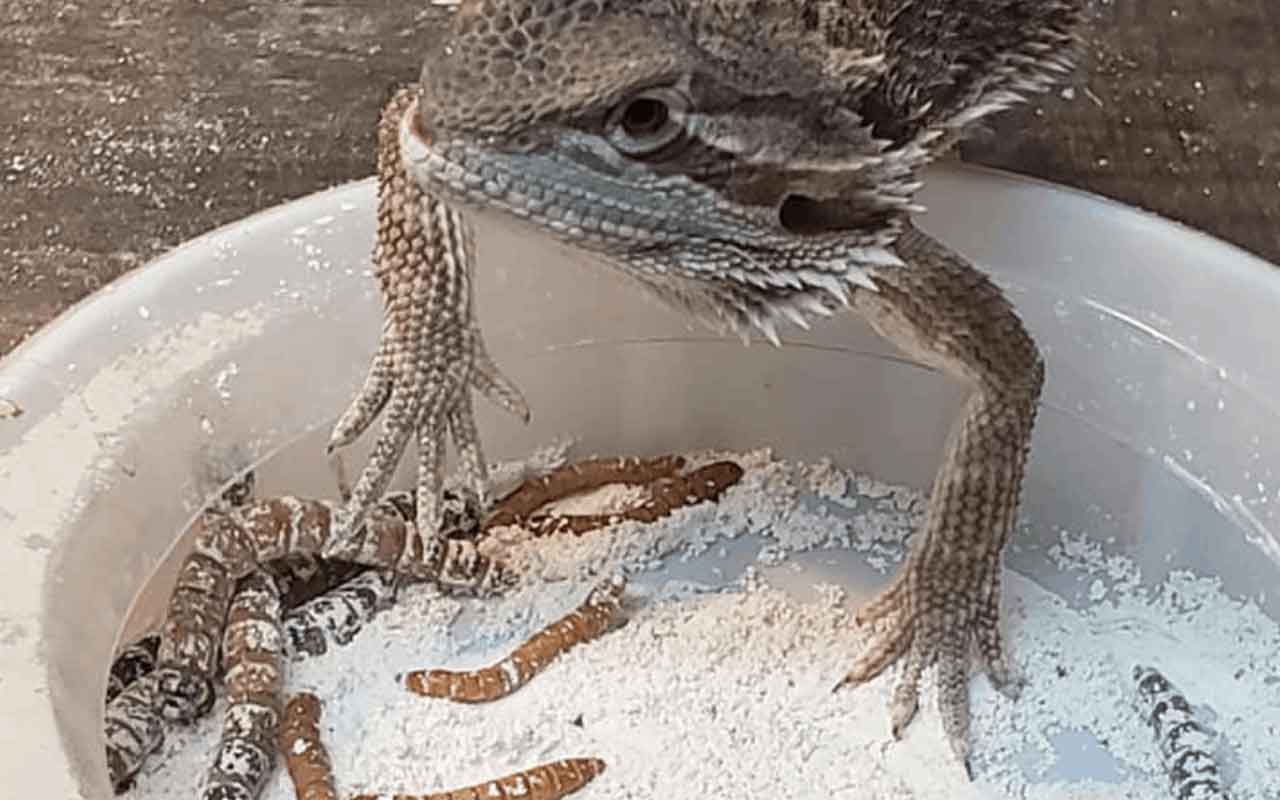Superworms are a type of insect larvae that can be used as a food source for bearded dragons. They are high in protein and fat and can provide some variety and enrichment to your bearded dragon’s diet.
Superworms are a popular treat for bearded dragons, but they should only be fed in moderation. Superworms are high in fat and protein, which can be beneficial for bearded dragons, but they can also lead to weight gain and other health problems if fed too often.
Table of Contents
What are superworms?

Superworms are the larvae of the darkling beetle Zophobas morio. They are a popular feeder insect for reptiles, amphibians, and other exotic pets.
Superworms are high in protein and fat, and they are also a good source of calcium and other nutrients. However, they are also high in chitin, which can be difficult for some animals to digest. As a result, superworms should only be fed to pets in moderation.
Superworms are about 1.5 to 2 inches long when fully grown. They have a dark brown or black body with a reddish-brown head. They are also known as kingworms, morio worms, and zophobas worms.
Superworms can be purchased from pet stores or online. They can be stored in a ventilated container at room temperature. They should be fed a diet of fruits, vegetables, and dog food.
Are superworms safe for bearded dragons?

Yes, superworms are safe for bearded dragons, but they should only be fed in moderation. Superworms are high in protein and fat, which can be beneficial for bearded dragons, but they can also lead to weight gain and other health problems if fed too often.
How often should bearded dragons eat superworms?
Bearded dragons should only eat superworms as a treat. They should not make up more than 10% of their diet. This means that an adult bearded dragon should only eat 2-3 superworms once or twice a week. Juvenile bearded dragons can eat a little more, but it is still important to limit their intake of superworms.
Here is a general feeding schedule for bearded dragons:
- Baby bearded dragons (0-3 months old): Feed 80% insects, and 20% vegetables.
- Juvenile bearded dragons (3-12 months old): Feed 70% insects, and 30% vegetables.
- Adult bearded dragons (12+ months old): Feed 60% insects, and 40% vegetables.
The specific amount of insects and vegetables that your bearded dragon needs will vary depending on its size, activity level, and metabolism. It is important to monitor your pet’s weight and adjust their diet accordingly.
Here are some other things to keep in mind when feeding superworms to your bearded dragon:
- Superworms should be gut-loaded with fruits and vegetables before feeding. This will help to ensure that your bearded dragon gets the nutrients it needs.
- Superworms should be the same size as your bearded dragon’s head. This will help to prevent choking.
- Remove any uneaten superworms from the enclosure after a few hours. This will help to prevent them from becoming a nuisance or attracting pests.
How many superworms should bearded dragons eat?
A good rule of thumb is that adult bearded dragons can eat superworms once or twice a week. During those feedings, you can provide two or three superworms. Any more than that, and the food can present potential health problems.
Older juvenile bearded dragons can enjoy superworms as well. They can have about the same amount as adults. However, you should not feed superworms to bearded dragons under 4 months old, as they are too large and hard for them to digest.
You should always provide a varied diet that includes other insects, vegetables, fruits, and supplements. This will ensure that your beardie gets all the nutrients they need to stay healthy and happy.
Here are some other good insects to feed your bearded dragon:
- Crickets
- Mealworms
- Dubia roaches
- Hornworms
- Waxworms
You can also feed your bearded dragon fruits and vegetables, such as:
- Collard greens
- Mustard greens
- Turnip greens
- Dandelion greens
- Hibiscus flowers
- Watermelon
- Cantaloupe
- Mango
How to prepare superworms for bearded dragons
To prepare superworms for bearded dragons, you need to follow these steps:
- First, you need to gut-load the superworms. This means feeding them a nutritious diet so that they pass those nutrients on to your bearded dragon when they are eaten. You can gut-load superworms with a variety of foods, such as:
* Fruits: Apples, bananas, carrots, melons, strawberries
* Vegetables: Broccoli, carrots, collard greens, kale, spinach
* Dog food: High-quality kibble.
This will enhance the nutritional value of the superworms and make them more beneficial for your bearded dragon. - Second, you need to dust the superworms with calcium powder. Calcium is essential for bearded dragons to prevent metabolic bone disease and other health issues. You can use a plastic bag or a container to coat the superworms with calcium powder before feeding them to your beardie.
- Third, you need to feed the superworms to your bearded dragon using tweezers or a feeding bowl. Tweezers can help you control the amount and speed of feeding, as well as prevent the superworms from biting your dragon. A feeding bowl can also work, but make sure it is shallow and smooth so that the superworms cannot escape or hide.
- Fourth, you need to monitor your bearded dragon’s reaction and appetite. Superworms are a tasty treat for bearded dragons, but they should not be overfed or given too frequently. Observe how your dragon enjoys the superworms and adjust the feeding schedule and quantity accordingly.
The risks of feeding too many superworms to bearded dragons
Feeding too many superworms to bearded dragons can have several negative effects on their health and well-being. Some of the risks are:
- Metabolic bone disease: Superworms are high in phosphorus, which can interfere with the absorption of calcium in bearded dragons. Calcium is essential for bone health and preventing metabolic bone disease, a common condition that affects reptiles kept in captivity. Feeding too many superworms can throw that balance off, creating dietary problems that eventually lead to metabolic bone disease.
- Obesity: Superworms are also high in fat, which can make bearded dragons gain weight quickly. Obesity can cause various health issues for bearded dragons, such as heart problems, liver disease, joint pain, and reduced lifespan. Bearded dragons need a balanced diet that includes low-fat insects, vegetables, fruits, and supplements.
- Gut impaction: Superworms have a hard exoskeleton, or chitin, that can be difficult for bearded dragons to digest. This can cause undigested food to get stuck in the digestive tract, leading to gut impaction. Impaction can cause bearded dragons to lose their appetite, become lethargic, and have trouble passing waste. Impaction can also lead to serious complications such as infection, organ damage, or death if left untreated.
- Bites and injuries: Superworms are not passive prey. They have strong jaws that can bite and injure bearded dragons. They also have a pin-like structure on their backs that they can use to defend themselves. These bites and injuries can cause pain, bleeding, infection, or stress for bearded dragons. To avoid this risk, you should always feed superworms to your bearded dragon using tweezers or a feeding bowl.
To summarize, superworms are a tasty treat for bearded dragons, but they should not be fed too often or too many. They can cause metabolic bone disease, obesity, gut impaction, and bites and injuries if overfed.
You should always provide a varied diet for your bearded dragon that includes other insects, vegetables, fruits, and supplements. This will ensure that your beardie gets all the nutrients they need to stay healthy and happy.

